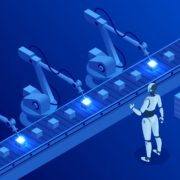9 Must-Read Books for the Tech-Obsessed
The rapid pace of technological innovation has come as a surprise to many, and even technologists are struggling to wrap their heads around the latest industry innovations. Technology has had a disruptive effect on almost every sector of the economy including retail, hospitality, travel, finance, sales, and real estate. Disruptive digital products have forever changed how people do business, and how consumers make buying decisions.
Given this reality, it’s more important than ever for technologists and business leaders to stay up to date with the latest digital trends and disruptive technologies. Rapid advancements in computing have made philosophers and public intellectuals revisit some of their most fundamental assumptions about human life. It’s also provided science fiction authors with endless new ideas, possibilities, and subject matter to explore in their writing.
Similarly, non-fiction technology writers have had to tackle some of the most counterintuitive and groundbreaking implications of innovative tech. Moreover, these astounding advancements take place across many different disciplines, from synthetic biology, to artificial intelligence, to 3D printing. Let’s explore 9 must-read books for those fascinated by all of this innovation.
1. The Singularity Is Near: When Humans Transcend Biology
The Singularity is Near by computer scientist and inventor Ray Kurzweil is a powerful work of non-fiction that explores the path ahead for humanity if modern technology trends continue. Kurzweil explores many ideas popular in science fiction and presents a persuasive case for why many of them might soon become science fact.
Among the many areas he explores include synthetic biology, computing, and artificial intelligence. Kurzweil’s exploration into these areas and his observation of exponential innovation in these fields leads him to conclude that humans will likely transcend physical and mental limitations. He posits that humans will likely merge with a powerful artificial intelligence, and defy physical limitations through the power of synthetic biology.
Finally, Kurzweil claims that humanity’s future after this phenomenon, which he refers to as the singularity, is impossible to conceive or predict. Written in 2005, the book is as relevant as ever for those passionate about technology.
2. The Martian
An impressive sci-fi novel by Andy Weir, The Martian tells the story of an astronaut that gets stranded on Mars after his crewmates abort their mission in space. The astronaut, named Mark Watney must find ways to survive on the red planet, and comes up with inventive new technologies in order to do so.
The book became a cult classic after Weir self-published the entire novel online after failing to find a publisher. It went on to become a viral sensation, attract publishers, and evolve into a New York Times bestseller. Cool Things Chicago has a great list of the best sci-fi books of all time, on which The Martian is included.
Technologists love the book because of its impressive adhesion to scientific principles and inclusion of scientifically valid technology and interplanetary survival strategies.
3. Do Androids Dream of Electric Sheep
Do Androids Dream of Electric Sheep is a dystopian science fiction classic by Philip K. Dick, which provided the inspiration for the Blade Runner movie franchise.
The book is set in a post-war world of environmental depletion, post-consumerism, and natural disaster. It follows the story of a bounty hunter named Rick Decker that is contracted to decommission defunct android units.
Decker soon finds, however, that the lines between man and machine aren’t as clear as he once thought. The book explores many themes that are right in Dick’s wheelhouse including the nature of consciousness, artificial intelligence, and humanity.
4. Tomorrowland: Our Journey from Science Fiction to Science Fact
Tomorrowland is a non-fiction book written by Steven Kotler that explores some of the most cutting edge and disruptive technologies today, and how they might shape our future.
Kotler explores how advances in synthetic biology could enable genetic modification in humans. He explains how this could lead to the controversial concept of “designer babies,” that is, babies engineered from birth to have certain genetic traits. He talks about the positive and negative implications of this technology, and how it could affect humanity’s development.
Kotler also explores the ramifications of other technologies including computation, artificial intelligence, and virtual reality.
5. Dune
Dune is a classic science fiction novel written by Frank Herbert that takes place in a faraway galaxy that is ruled by competing royal families.
The novel follows young Paul Atreides, an heir to a noble family who inherits a planet known as Arrakis. The planet, also called Dune, is a barren wasteland, but for its supply of an ever important natural resource known as Dust.
Dust allows spacefarers to power their ships, but Atreides soon finds that it could do much more.
6. Physics of the Future
Written by theoretical physicist Michio Kaku, Physics of the Future is a book about how science will shape human destiny and our daily lives. Kaku theorizes possible future technologies that could be invented in the next 100 years that are in line with our current understanding of the laws of Physics.
Kaku touches on technologies in the fields of medicine, computer science, AI, and nanotechnology, as well as their possible ramifications.
Kaku even presents a relevant timeline of many of his predictions, broken up into different parts of the book. It’s a highly engaging read that is almost certain to delight tech enthusiasts.
7. Foundation
One of the most famous works of science fiction, the Foundation series by Isaac Asimov has been beloved by technologists for decades.
It tells a grand tale of the rise and fall of a galactic society that has perfected a fictional science that allows them to predict future events with great accuracy.
The books deal with many philosophical ideas such as predetermination, and they incorporate a profound view of technology’s role on human life that was decidedly ahead of its time.
8. The Age of Spiritual Machines
The second book by author Ray Kurzweil on this list, The Age of Spiritual Machines is a profound exploration of what happens if or when computers exceed human intelligence.
A work of nonfiction, Kurzweil presents evidence for his theory that humans will create machines more intelligent than they are, and what this would mean for humanity’s advancement.
He also explains why the computational capacity of computers is exponential and why that could mean that superintelligent machines could be invented sooner than we think.
9. The Future is Faster than You Think
The Future is Faster than You Think is a nonfiction book by bestselling author and investor Peter Diamandes that explores how the world will change as a result of technological disruption.
It explains how many industries have changed forever due to technology’s disruptive effects, and why this will continue.
Diamandes extrapolates on the secondary and tertiary effects of this disruptive technology, and how it’s likely to shape our future. The book is a follow up from Diamandes’s prior bestseller, Bold.
















